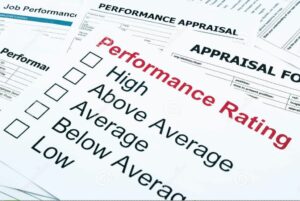When It Comes to Performance Reviews, Ditch the Labels
 Say it’s performance review time and you nonchalantly slip in that one of your team members, let’s call her Madison, “needs to be more professional.”
Say it’s performance review time and you nonchalantly slip in that one of your team members, let’s call her Madison, “needs to be more professional.”
In your mind, you know exactly what this means. It’s helpful and straight-forward feedback. Twenty years from now when Madison is managing partner and she is receiving a prestigious accounting award, she will thank you from the stage for this moment. Pat on the back for you!
But in reality your concise comment leads to confusion. You see it in Madison’s facial expression—her eyes widen, then narrow; her eyebrows furrow. She seems crestfallen. Madison is one of your best CPAs, and now she is shutting down.
Red lights begin flashing in your mind and your conflict-manager-brain starts shouting “ABORT!”
Words Matter
The above example may be dramatic, but you see my point. One word without a clear and common understanding can lead to unintended consequences.
In this example, Madison has a few options for responding to this feedback. She can lean into it and ask what you mean. (But really, considering the power dynamics in a performance review, who wants to do that?). Or she can say “ok,” leave the room, and always wonder whether she’s meeting your threshold for professionalism. The former puts the burden on her in an uncomfortable situation. And the latter will likely lead to her becoming paranoid at best or disenfranchised at worst.
How Do You Define ‘Professional?’
How would your fellow CPAs define professional? What are the odds that the group has a common definition?
- Does ‘professional’ refer to attire? Does it mean wearing a jacket in client meetings? Does the color of the jacket matter?
- Does it refer to how a person carries herself?
- Does it refer to communication style? Are one-word emails considered efficient or unprofessional?
One word leads to so many questions. Without common definitions and clear expectations, words can come across as ambiguous, thus undermining the feedback that you are trying to deliver.
Take These Examples
In a recent workshop at a public accounting firm, I asked the group to jot down the least helpful feedback that they had received from a manager, partner or another supervisor. Here are some of the responses:
- “You ask too many questions.”
- “You could be more professional.”
- “Don’t be so communicative.”
- “You need to be more competitive.”
- “Talk less.”
- “You’re too quiet.”
- “Improve the quality of your work.”
Another common area of feedback that can be confusing has to do with time. Like telling another team member he is often late. What does ‘late’ mean in your office? 5 minutes after the office opens? 10 minutes? 30 minutes? What defines ‘often late’? Again, everyone’s response to this question will likely be different.
Tips for better reviews
Here’s some advice I offer my clients who want to deliver clear and meaningful feedback to team members.
- Avoid labels. Instead, provide specific details about what you observe and talk through possible solutions.
- Don’t avoid conflict and let things build up. Saving your critique for a semi-annual or annual formal review is not good for you or your team. If it is worthy of being in a written review, it should be talked about before the formal process. Formal reviews are not a time for surprises.
- Clearly define and set expectations. Help ensure your team understands the norms of the company and your clients. Forcing a team member to figure out the unwritten rules is inefficient and unfair.
- On delivering feedback from others… Be sure it’s valuable and that you understand it. Saying “someone on the team thinks your unprofessional, but I don’t know why” will not help the person being reviewed, nor will it promote team cohesion. Instead have a conversation involving both parties to find clarity, and maybe even a resolution, before delivering a 3rd party message.
- Check your biases. As a leader you should have expectations for your team. However, a little flexibility can go a long way when building morale. This can apply to any number of topics from apparel choices to communication styles. Outside of our balance sheets, there can be more than one right way to do things. Your team will appreciate having some space for self-expression.
 Kristen Rampe heads Grand Rapids-based Rampe Consulting, which advises CPA firms coast-to-coast on practice management, with emphasis on deepening client relationships, communications, team building and collaboration, increasing efficiency, optimizing firm profitability and developing leadership. Prior to forming her own CPA consulting firm, she spent three years with Big 4 powerhouse PwC, and 7 years with Top 50-ranked Frank Rimerman. As a rising star of the industry’s next generation, she brings a fresh perspective to the trends and topics our blog and Practice Management Series continue to address. Check back for her regular contributions. Kristen welcomes your comments!
Kristen Rampe heads Grand Rapids-based Rampe Consulting, which advises CPA firms coast-to-coast on practice management, with emphasis on deepening client relationships, communications, team building and collaboration, increasing efficiency, optimizing firm profitability and developing leadership. Prior to forming her own CPA consulting firm, she spent three years with Big 4 powerhouse PwC, and 7 years with Top 50-ranked Frank Rimerman. As a rising star of the industry’s next generation, she brings a fresh perspective to the trends and topics our blog and Practice Management Series continue to address. Check back for her regular contributions. Kristen welcomes your comments!
Get our expertise delivered to your inbox.